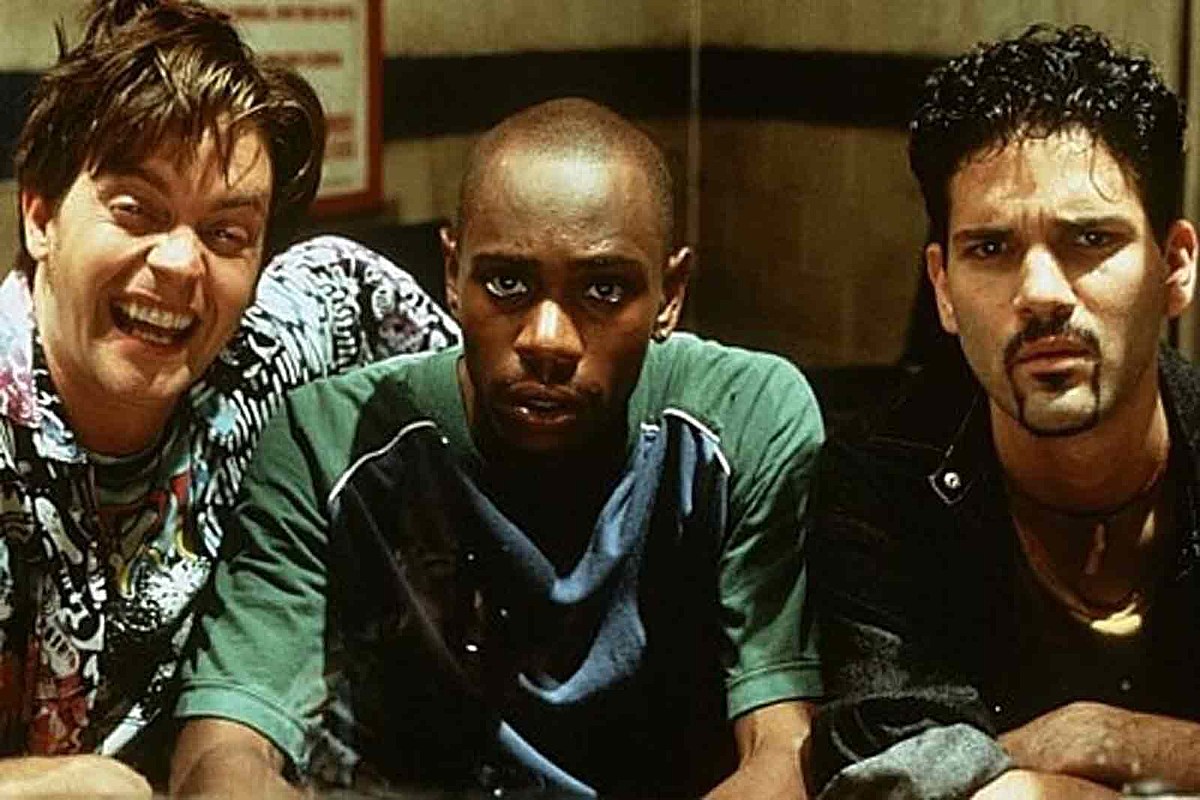Classic Rock
‘Half-Baked’ Almost Destroys Chappelle’s Career
Where you stand on Half-Baked probably depends on where you stand on two other things: Dave Chappelle‘s comedy stylings and stoner comedies in general. If you’re a fan of both, then Half-Baked is or should be a rippin’ classic; If you’re lukewarm on either, then you’re probably tempted to write off the movie as ridiculous, underproduced and full of childish gags.
This is a shame because if you write it off, you’re missing out on one of the most fascinating and subtly important comedies of the 1990s.
Chappelle (who also co-wrote the film) stars as Thurgood Jenkins, one of four friends in New York City who, to put it bluntly, smoke a lot of weed. Thurgood works as a janitor at a pharmaceutical company that’s researching the medicinal effects of marijuana, and the action begins when he and his three buddies smoke some of the company’s specially engineered stuff. One of them, Kenny (Harland Williams), then goes out to get some snacks and accidentally kills a diabetic police horse by feeding it junk food.
He gets thrown in jail, leaving it up to Thurgood, Brian (Jim Breuer) and Scarface (Guillermo Diaz) to raise enough money to get him out. In the classic stoner-movie tradition, they come up with a terrible plan: steal a bunch of weed from Thurgood’s pharmaceutical company and sell it all over the streets of New York City, where it was, at the time, still illegal.
This creates zany confrontations with a range of different characters, from Thurgood’s new girlfriend (Rachel True), whom he’s lied to about his love of the green stuff to a famous rapper named Sir Smoke-a-Lot (also played by Chappelle) to a drug lord (Clarence Williams III). Many stoned hijinks ensue, and in the end, everything turns out OK, with Thurgood even giving up smoking dope for his girlfriend because no matter how much he loves the ganja, he loves women more.
Over the years, the film has predictably gone on to become something of a cult classic, And this isn’t just because it has an appeal to a certain set of late-night inebriated viewers or because of its celebrated cameos by everyone from Jon Stewart and Stephen Baldwin to Snoop Dogg and Willie Nelson.
Both the writing and the comedic set pieces are consistently strong from top to bottom, due to the collaboration of Chappell and co-writer Neal Brennan, who would go on to co-create and co-write Chappelle’s Show in the early 2000s. In many ways, the film feels like a dry run for that show, which would propel Chappelle to superstardom: It has the same edgy sense of humor and continually pushes its bits in entirely unexpected directions.
But despite its appeal, Half-Baked – which premiered in theaters on Jan. 16, 1998 – nearly sank Chappelle’s career. Before the film, the comedian was seen as on the rise in Hollywood. He had appeared in all the big stand-up comedy spots on TV, from Def Comedy Jam to The Late Show With David Letterman, and was beginning to land minor roles on the big screen, in projects like Eddie Murphy’s The Nutty Professor and Con Air. So he got together with Brennan and wrote a feature script and asked his buddy Breuer to costar.
Watch the ‘Half-Baked’ Trailer
On its release, the film made money in theaters – $17.5 million on a budget of $8 million, which seems high, given the low production values – but it was savagely panned by critics, who’ve never met a stoner comedy they don’t love to hate. In an interview with the Your Mom’s House podcast, Brennan remembered thinking the movie was the end of Chappelle in Hollywood: “They literally said on CNN, ‘His career is over.'”
Chappelle’s father had died at about the same time, and the stress from that, along with the reception of Half-Baked, drove the comedian to think about quitting the industry altogether. He bought a farm in Ohio, and, as he told James Lipton on an episode of Inside the Actor’s Studio, recalled thinking that he “was done with show business.”
Eventually, Chappelle’s career would recover, and then some. Several years later, he would reunite with Brennan to create Chappelle’s Show, which would become a sensation. And he has always tended to write off Half-Baked, telling Lipton in the same interview that he didn’t love being remembered for it and that “the script was way better than the movie.”
But the film deserves better than to be remembered as a one-off misfire. Viewed now, what’s striking – beyond the degree that it seems to be more in line with Chappelle’s later success than to run contrary to it – is how influential it is. Goofy movies about heavily stoned characters go back to Cheech & Chong‘s work in the ’70s, and the history of inebriated characters doing funny things onscreen extends back to the early days of Hollywood; Charlie Chaplin played that gag many times and as well as anyone ever has.
But what Half-Baked helped introduce was an overt admittance that regular people were smoking pot and doing it a lot. When Thurgood and his buddies go on their selling spree, they encounter all kinds of people, including teenage kids and their parents, famous music stars and more. The insinuation is that no matter how many people might want to limit it, marijuana use is here to stay. Within a decade of its release, as marijuana began to be made legal at the state level, the film’s prediction became real.
On top of this, the movie mixes a slacker tempo with a visual absurdity that anticipated, and influenced, a huge swath of the comedy films of the following decades. Dude, Where’s My Car? (2000), Harold & Kumar Go to White Castle (2004), Knocked Up (2007), Pineapple Express (2008) and a legion of lesser-well-remembered films of their ilk are all directly indebted to Half-Baked, and it helped inspire a distinctive moment of comedic absurdism that pervades films like Anchorman (2004), 21 Jump Street (2012) and The Lego Movie (2014).
So while Half-Baked is usually remembered as a kind of stoned side note to Chappelle’s career, it’s probably better seen as a turning-point movie, signaling the advent of new trends in both comedy and the culture at large. And it’s not a bad late-night joint either.

